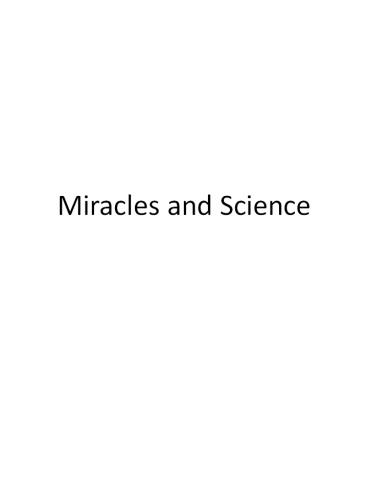Miracles and Science - PowerPoint PPT Presentation
1 / 12
Title:
Miracles and Science
Description:
If such events can be described as miracles, why should the defintion or ' ... Misperception, the 'desire for the astonishing' or simple human mischief are ... – PowerPoint PPT presentation
Number of Views:1135
Avg rating:3.0/5.0
Title: Miracles and Science
1
Miracles and Science
2
Definitions of Miracle
- C.S. Lewis An interference with nature by
supernatural power (Intervention Miracles) - David Hume A violation of the laws of nature
(Intervention Miracles) - John Polkinghorne An event of an extraordinary
kind, brought about by a god, and of religious
significance (Natural Miracles)
3
Scientific SkepticDavid Hume
- Science shows that natures laws are unalterable
- Extraordinary events require extraordinary proof,
but reverse holds for miracle - Misperception, the desire for the astonishing
or simple human mischief are more likely
explanations - Why do competing religions all have miracles?
4
Contingency Miracles
- R.F. Holland points out that many miracles
reported by believers simply involve very
unlikely events - If such events can be described as miracles, why
should the defintion or miracle necessarily
involve the breaking of laws of nature?
5
Classical Scientific View
- Determinism Everything that happens according
to strict laws, with not exceptions (no freewill) - Reductionism (Mechanistic Outlook) The world is
like a machine (eg clock) the parts can fully
explain the whole - Materialism The world is composed of a bunch of
distinct material objects (atoms)
6
Quantum Mechanics
- The physics of the very small developed early in
the 20th century - Its well established theories present many
findings counter to classical views - Subatomic particles can behave as particles and
waves - Can occupy more than one position at once
- Can influence other particles over vast
distances, with no apparent connection - Requires an observer
7
The Double Slit Experiment
- The behavior of sub- atomic particles changes
when observed - The particles behave as waves and particles,
depending on the observation - The exact trajectory of any atom can never be
predicted with certainty (events can never be
verified to be perfectly determined, but only
behave according to laws of probability)
8
John Bells Experiments
- Source emits two photons (A B) in opposite
directions - Detector 30 km away detects As spin (which is
indeterminate, but must always be opposite to Bs) - B is detected immediately after A (too fast for
light to travel between the two) - B is always opposite spin of A
- Established the QM notion of Entanglement
9
The New Physics
- World is not mechanistic, but interconnected
(more like an organism) - World is not deterministic, but ruled by a
mixture of law and probability (indeterminacy) - World is not clearly material, but is
multi-dimensional and more like an information
system than a mechanism
10
Quantum Physics and Religion
- Provides opportunities for integration between
science and religion - Some people take the findings of quantum
mechanics as proof of the eastern religions
claims about the unity of all reality (holism) - Others see in these discoveries a space (the
quantum zone of indeterminacy) for God to act
providentially in the world that is compatible
with science
11
Polkinghorne
- Miracles are possible, but not in Lewis sense
- Quantum Theory or simple synchronicity make
extraordinary events possible - Theological problem of MiracleChristian God of
steadfast faithfulness vs. interventionist god
who practices favoritism - Perhaps miracles must be so rare b/c God is
self-limited by his respect of the freedom of
his creation
12
Objections to Hume
- Is rejecting miracle on principle really a
scientific way of looking at the question? - Why must one assume deterministic view of nature?
- Why must one assume that God would not respond to
wishes of non-believers (exclusivism)?































